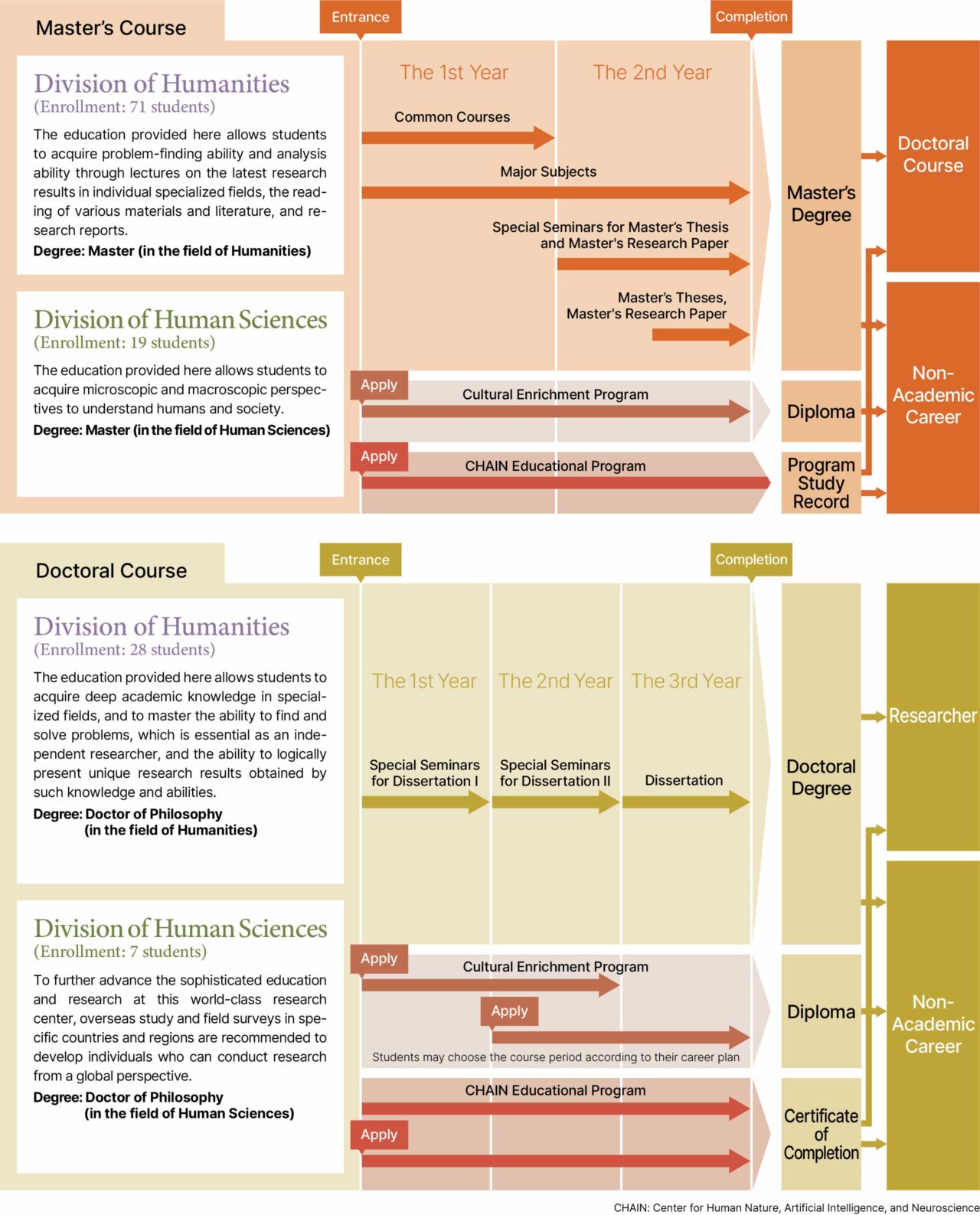The Two-Division System: The “Division of Humanities” and The “Division of Human Sciences”
The Graduate School of Humanities and Human Sciences is made up of two divisions. First, there is the “Division of Humanities”, which provides a comprehensive education to all of its students by uniting what had been three separate departments in the previous Faculty of Letters: “Philosophy and Cultural Studies”, “History and Anthropology”, and “Linguistics and Literature”. The second is the “Division of Human Sciences”, which not only maintains its previous role as an environment that can foster high level research, but has also been even further developed than it was during its tenure in the Faculty of Letters.
By studying the various fields that make up the human and social sciences, students are able to attain a broader perspective and become more knowledgeable about humanity and society.
Thus, the diverse array of 11 departments and 20 laboratories is split into 2 divisions. Between both of these divisions, there are over 100 faculty members available to help provide students with a flexible education.
Division of Humanities
- The Division of Humanities covers many diverse fields and allows for students to gain a comprehensive, multi-disciplinary education. The flexible curriculum offered at the Division of Humanities is designed to respond to and encourage graduate students’ desire to study.
- We have established new laboratories for Archaeology, Cultural Anthropology, Museum Studies, as well as Ainu and Indigenous Studies, thus allowing us to respond to more issues in society and produce an even more diverse education for our students.
- This division also features several fields of research that are only possible in Hokkaido, thanks in no small part to its special geographical situation. This is best exemplified by the laboratories for Slavic-Eurasian Studies and the Ainu and Indigenous Studies.
Division of Human Sciences
- It is possible to comprehensively study both humans and society at the Division of Human Sciences.
- It is also possible to receive a high-level education based on experimental scientific results, outgoing from world-class academic studies that utilize the results of large-scale research projects.
- Students can even learn various research methods for how to do experiments, engage in practical learning, and conduct fieldwork.
- Students can take advantage of the scientific research being done at an international level here at the Division of Human Sciences as well.
The Establishment of Common Courses between Divisions
”Common Courses” allow students to obtain new perspectives and broadly learn about the humanities and the social sciences.
All of the various departments in these two divisions work together to offer four “common courses” for all students. These four courses are: Humanities Approaches to Social Structure, Multiple Approaches to Environmental and Cultural Issues, Comprehensive Approaches to Society and Information, and Research Ethics and Thesis Guidance. By being able to take these courses and learn broadly about the various fields in the humanities and social sciences, students are able to gain a new perspective on humanity and society as a whole, and also to obtain a more profound understanding of academic research methods.
The Goals of Our Education
Division of Humanities
- Whether it be for the sake of theoretical/experimental basic research related to any particular field or for the sake of researching actual questions related to the society we live in, we hope to educate students in a way that can help them master the various research methods needed to tackle these problems. We also hope to educate students so that they become able to appropriately understand the prior research that has been done in their field. Moreover, we hope to educate students who can accurately calculate and analyze data collected from a variety of sources, including (when necessary) their own on-site investigations.
- We hope to educate students so that they become able to deeply understand other cultures as well. We hope to educate students so that they will be able to use their powers of observation and analysis on order to accurately grasp the concrete challenges that are currently facing many different regions and ethnicities. Finally, we hope to educate students who are capable of utilizing a comprehensive range of abilities, thus making them capable of performing jobs that require a high level of specialization in the future.
Division of Human Sciences
- We hope to educate students who are capable of grasping specialized knowledge relating to fields such as cognitive psychology, social psychology, cognitive science, behavioral science, sociology, regional sociology, and social ecology.
- We hope to educate students capable of conducting research on humans and society by using a scientific or positivistic approach.



